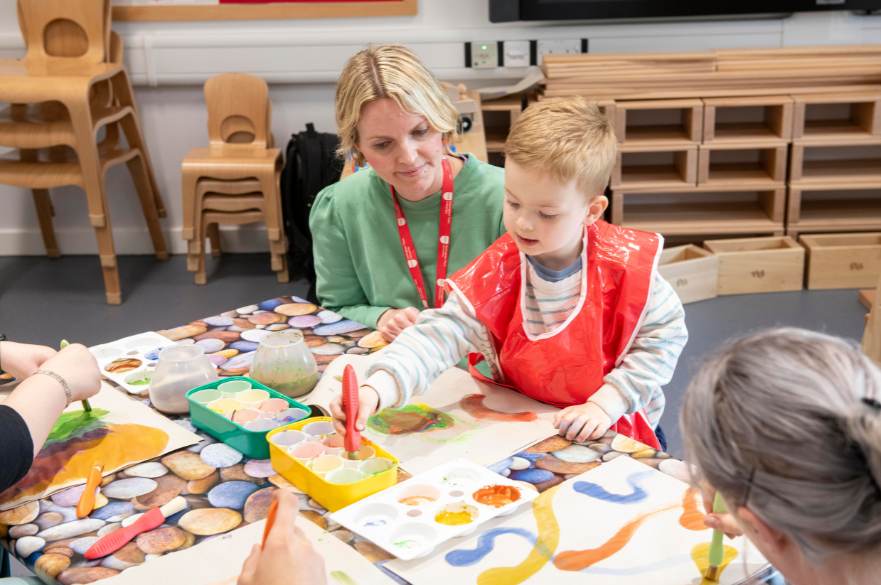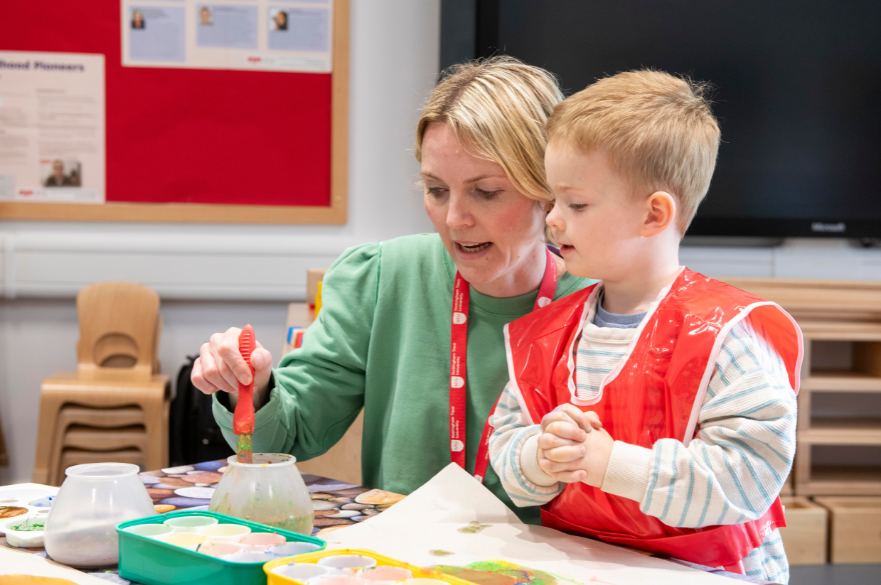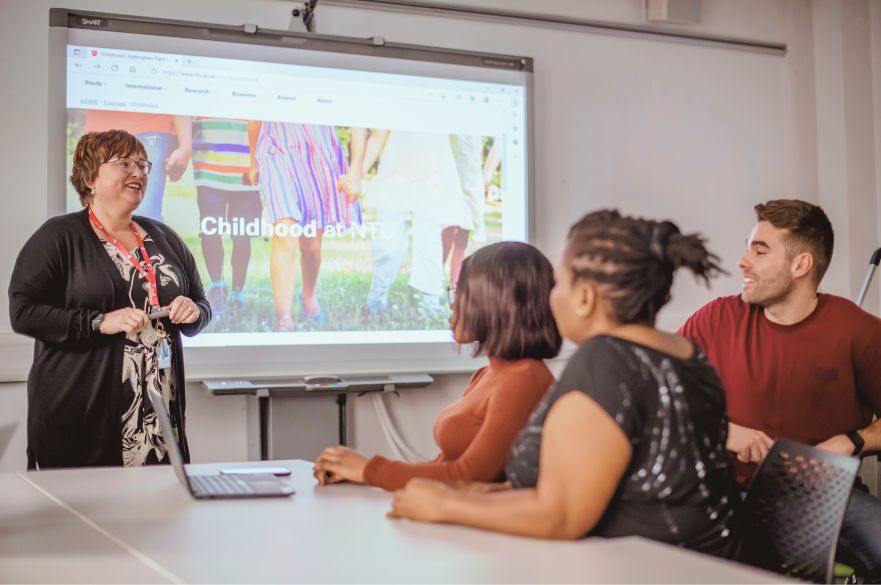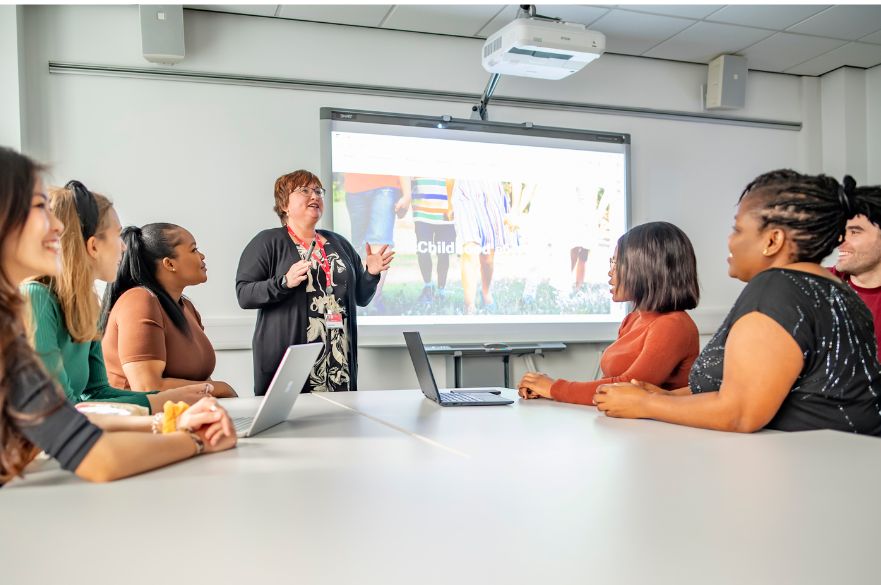About this course
The childhood and education sector is rewarding, complex and continually evolving. With the BA (Hons) Childhood and Education Studies (Top-Up) course, you’ll study childhood from birth to adulthood through research-informed practice and contemporary debate. You’ll have the freedom to explore the topics that matter to you – equipping you with the tools to make a difference in your own setting and society.
Studying with NTU, you’ll gain the skills and expertise to become a leader of tomorrow. You’ll address today’s complex social issues - whether that’s focusing on decolonisation or identity development. You’ll explore philosophical constructs allowing you to better understand working environments and become a confident practitioner.
This course is designed for you if you hold a relevant level 5 qualification and want to top up to BA honours degree level. Our online learning approach will allow you to further your career in early childhood, childhood or education alongside work and other commitments.
-
Flexible online learning approach, allowing you to fit in learning around other commitments.
-
Choice of specialist modules in line with your specific interests and career aims.
-
Learn from tutors and students in a collaborative and supportive environment.
-
Benefit from NTU’s top-class teaching, award-winning research and excellent career opportunities.
15
What you’ll study
As you study childhood from birth to 18 years of age, you’ll broaden your understanding of approaches to research, theories of learning, education policy and a general understanding of childhood education in political, social, and economic contexts.
Legacy Research Project (40 credit points)
- Taught in terms one, two and three, this module allows you to engage in a prolonged piece of supervised action research.
- This will tie in directly to your placement experience (either in employment or voluntary placement) and will allow you to acquire the necessary undergraduate research skills required at this level of study whilst also offering their placement setting a lasting intervention/legacy project.
Contemporary Debates (20 credit points)
- Taught in term one, you’ll be exposed to dominant discourses that impact upon children’s lives from maternity care through to their eighteenth year.
- Session content will be updated to reflect changes in contemporary issues in the childhood sector.
- Issues affecting the statutory, independent, and voluntary sectors will be examined allowing students to engage in critical enquiry and reflexive practice.
The course design allows you to select a specialist pathway that is tailored to your area of professional interest. In terms two and three, you’ll follow a pathway consisting of three modules.
Early Childhood Pathway
Research Agendas in Early Childhood (20 credit points)
- You’ll examine some of the research agendas within the statutory, voluntary, and independent early childhood sectors.
- The module focusses on the research work completed by practitioners and how these agendas might influence change in practice.
The Power of Leadership (20 credit points)
- You'll examine the nature of leadership and leaderful practice in the early childhood sector.
- Looking at contemporary debates, theories of leadership and what it means to be a leader in early childhood, students explore their role as future leaders in this field.
Inclusion in the Early Childhood Sector (20 credit points)
- This module examines the statutory requirements around inclusion and SEND in early childhood environments.
- You’ll explore the legislative frameworks, statutory and non-statutory guidance documents in relation to this aspect of practice.
Childhood Pathway
Sustainable Childhoods (20 credit points)
- This module identifies what is meant by the term ‘sustainable childhoods’ and consider a range of underpinning theoretical models and viewpoints.
- You’ll be encouraged to adopt global contemporary perspectives in relation to global childhoods and will employ theory and practice concepts to better understand this.
- You’ll be encouraged to reflect on global initiatives and professional practices within the context of sustainability.
Future Childhoods (20 credit points)
- Employing a sociological lens, you'll investigate the concept of gender, its categorizations, and the emergence of gender diversity within British and global societies.
- You’ll consider the development of sexual identity and the development of this sense of identity.
- The module will explore concepts including gender binary, gender neutrality, sexual ambiguity, models of gender affirmation and transgenderism within global societies. The module will consider contemporary arguments around RSE within early childhood contexts.
What Can Comic Books Teach us About the Philosophy of Childhood and Education? (20 credit points)
- This module employs comic books as a foundation for examining the philosophy of education.
- You’ll engage with a wide variety of classical and contemporary philosophical constructs and explore how these are evident in both the fictionalised worlds of comic book stories and in contemporary education spaces.
Education Pathway
Education and Digital Technologies: Teaching in an Online World (20 credit points)
- The module examines how online and digital technologies influence education throughout life.
- Societal attitudes, socioeconomics and the digital divide will be used as lenses through which to examine contemporary education practices and policies.
- You’ll explore the role of educationalist in the delivery of effective practice will be explored within and beyond mainstream education.
Future Childhoods (20 credit points)
- Employing a sociological lens, you’ll investigate the concept of gender, its categorizations, and the emergence of gender diversity within British and global societies.
- You’ll consider the development of sexual identity and the development of this sense of identity.
- The module will explore concepts including gender binary, gender neutrality, sexual ambiguity, models of gender affirmation and transgenderism within global societies.
- The module will consider contemporary arguments around RSE within early childhood contexts.
What Can Comic Books Teach us About the Philosophy of Childhood and Education? (20 credit points)
- This module employs comic books as a foundation for examining the philosophy of education.
- You’ll engage with a wide variety of classical and contemporary philosophical constructs and explore how these are evident in both the fictionalised worlds of comic book stories and in contemporary education spaces.
We regularly review and update our course content based on student and employer feedback, ensuring that all of our courses remain current and relevant. This may result in changes to module content or module availability in future years.
How you're taught
The course is taught online, allowing you to achieve a degree-level qualification that fits in with work and personal commitments.
You’ll require a PC, laptop or tablet device with access to a stable internet connection.
Learning and teaching methods include:
- Engagement with pre-study academic skills learning materials to prepare you for your learning journey
- Live taught online sessions
- One-to-one supervision of your legacy research project
- Small group online seminar activities
- Engagement with asynchronous (taught online) video content
- One-to-one tutorials
- Regular Personal and Academic Tutorials (PAT)
- Sequential delivery of a minimal number of modules at a time
- Authentic assessment grounded in real world learning.
A key feature of the learning experience is that – although you may be at a distance from the University’s campus – you are able to learn from each other, as well as from the tutors, in a supportive environment.
Like all other students at NTU, you are entitled to come onto campus should you wish and will have access to the suite of additional support services available. This includes access to the library support team (and their frequent online tutorials), the well-being team, the NTU Student Union and the St3p Up student support service.
Students will also have access to the ‘Student Lounge’ online space for socialisation between face-to-face and taught online students.
How you're assessed
This course is assessed solely through coursework, with a variety of dynamic, exciting and creative assessment methods, including:
- research legacy project - a piece of coursework based on practice allowing you to enact a policy or practice change in your setting.
- poster presentations
- media presentations
- portfolio of evidence
- blogs.
Contact hours
Learning engagement time
The Research Legacy Project module runs for the full three terms with learning engagement time as follows:
- Six, three hour live, taught online sessions.
- Approximately 12.6 hours of independent/directed learning each week.
- Five one-to-one tutorials with your supervisor throughout the year (20 minutes for each meeting).
For all other 20 credit modules the learning engagement time is:
- Three, three hour taught online live sessions.
- 12.7 hours of independent/directed learning per-week.
Careers and employability
The course provides you with the opportunity to develop your professional knowledge and practice, to the extent you will be ready for a range of diverse and rewarding employment opportunities, such as:
- Early Childhood Graduate Leader
- Educational Developer
- Youth Development Worker
- Volunteer Coordinator
- Careers Leader
- Museum Educator
- Academic Advisor
- Student Support Officer
- Learning Mentor
- Youth Worker
- Community Worker
- Early Help Advisor
- Youth Mental Health Worker
- Researcher
- policy development
- postgraduate study.
Careers Team
Our award-winning Employability team is here to inspire and enhance your career planning, whichever path you choose. Whether you wish to go on to further study or to look for job opportunities, we can guide you to be a successful candidate.
Entry requirements
UK students
A full and relevant Level 5 qualification, for example, Early Childhood or Early Years:
- Apprenticeship
- Higher National Diploma
- Foundation Degree, or equivalent.
To find out what qualifications have tariff points, please use our tariff calculator.
Additional requirements for UK students
- English GCSE or equivalent.
- Successful completion of the Academic Skills Pre-study module.
- Successful completion of an online interview.
- Work experience is preferred, but applications will be considered without it.
Contextual offers
If you don’t quite meet our entry requirements, we might be able to make you a lower offer based on a range of factors, including your background (such as where you live and the school or college you attended), your experiences and your individual circumstances (you may have been in care, for example). This is called a contextual offer, and we get data from UCAS to help make these decisions. We do this because we believe everyone with the potential to succeed at NTU should have the opportunity to do so, no matter what barriers you may face.
Other qualifications and experience
NTU welcomes applications from students with non-standard qualifications and learning backgrounds, either for year one entry or for advanced standing beyond the start of a course into year 2 or beyond.
We consider study and/or credit achieved from a similar course at another institution (otherwise known as credit transfer), vocational and professional qualifications, and broader work or life experience.
Our Recognition of Prior Learning and Credit Transfer Policy outlines the process and options available for this route. If you wish to apply via Recognition of Prior Learning, please contact the central Admissions and Enquiries Team who will be able to support you through the process.
Getting in touch
If you need more help or information, get in touch through our enquiry form.
International students
Academic entry requirements: We accept equivalent qualifications from all over the world. Please check your international entry requirements by country.
A full and relevant Level 5 qualification, for example, Early Childhood or Early Years:
- Apprenticeship
- Higher National Diploma
- Foundation Degree, or equivalent.
English language requirements: See our English language requirements page for requirements for your subject and information on alternative tests and Pre-sessional English.
Additional requirements for international students
- English GCSE or equivalent.
- Successful completion of the Academic Skills Pre-study module.
- Successful completion of an online interview.
- Work experience is preferred, but applications will be considered without it.
English language requirements
View our English language requirements for all courses, including alternative English language tests and country qualifications accepted by the University.
If you need help achieving the language requirements, we offer a Pre-Sessional English for Academic Purposes course on our City campus which is an intensive preparation course for academic study at NTU.
Other qualifications and experience
If you have the right level of qualifications, you may be able to start your Bachelors degree at NTU in year 2 or year 3. This is called ‘advanced standing’ entry and is decided on a case-by case basis after our assessment of your qualifications and experience.
You can view our Recognition of Prior Learning and Credit Transfer Policy which outlines the process and options available, such as recognising experiential learning and credit transfer.
Sign up for emails
Sign up to receive regular emails from the International Office. You'll hear about our news, scholarships and any upcoming events in your country with our expert regional teams.
Getting in touch
If you need advice about studying at NTU as an international student or how to apply, our international webpages are a great place to start. If you have any questions about your study options, your international qualifications, experience, grades or other results, please get in touch through our enquiry form. Our international teams are highly experienced in answering queries from students all over the world.
Policies
We strive to make our admissions procedures as fair and clear as possible. To find out more about how we make offers, visit our admissions policies page.











